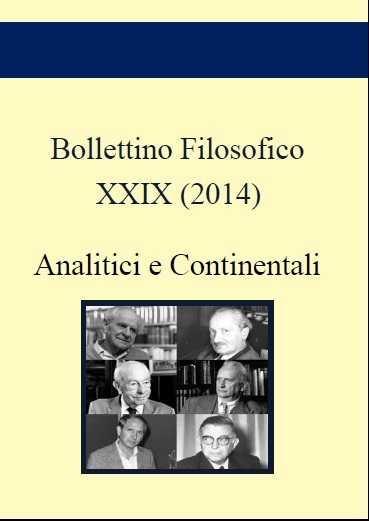La filosofía Analítica: una aproximación genética
Abstract
In questo contributo, mi occuperò del primo elemento della distinzione – peraltro concettualmente difettosa – tra filosofia analitica e continentale. Sebbene le espressioni “filosofia analitica” e “filosofo analitico” siano ampiamente utilizzate dai filosofi di professione, non è ovvio che tali espressioni indichino un concetto comune per tutti quelli che le utilizzano. Non è nemmeno scontato che il singolo parlante attribuisca ad esse un significato uniforme in diverse occasioni. Inoltre oggigiorno, numerosi autori dubitano che tali espressioni abbiano un contenuto chiaro. In questo contributo sosterrò, invece, che considerare ‘analitici’ alcuni filosofi, e certe opere filosofiche, non è del tutto privo di giustificazione. Per difendere questa visione, cercherò di fare uso di una caratterizzazione genetica della filosofia analitica, in base alla quale sussiste una continuità interna, concettuale tra l’opera e gli autori considerati come fondatori della tradizione analitica e una parte importante della filosofia che attualmente è chiamata ‘analitica’.
Downloads
Bollettino Filosofico pubblica in internet, ad accesso aperto, con licenza:
|
|
CCPL Creative Commons Attribution |
L'autore conserva il copyright sul suo contributo, consentendo tuttavia a chiunque "di riprodurre, distribuire, comunicare al pubblico, esporre in pubblico, rappresentare, eseguire e recitare l'opera", purché siano correttamente citati l'autore e il titolo della rivista. L’autore, al momento della proposta di pubblicazione, è inoltre tenuto a dichiarare che il contenuto e l’organizzazione dell’opera è originale e non compromette in alcun modo i diritti di terzi, né gli obblighi connessi alla salvaguardia di diritti morali ed economici di altri autori o di altri aventi diritto, sia per testi, immagini, foto, tabelle, sia per altre parti di cui il contributo può essere composto. L’autore dichiara altresì di essere a conoscenza delle sanzioni previste dal codice penale e dalle leggi speciali per l’ipotesi di falsità in atti ed uso di atti falsi, e che pertanto Bollettino Filosofico è esente da qualsiasi responsabilità di qualsivoglia natura, civile, amministrativa o penale, e sarà dall'autore tenuta indenne da qualsiasi richiesta o rivendicazione da parte di terzi.
